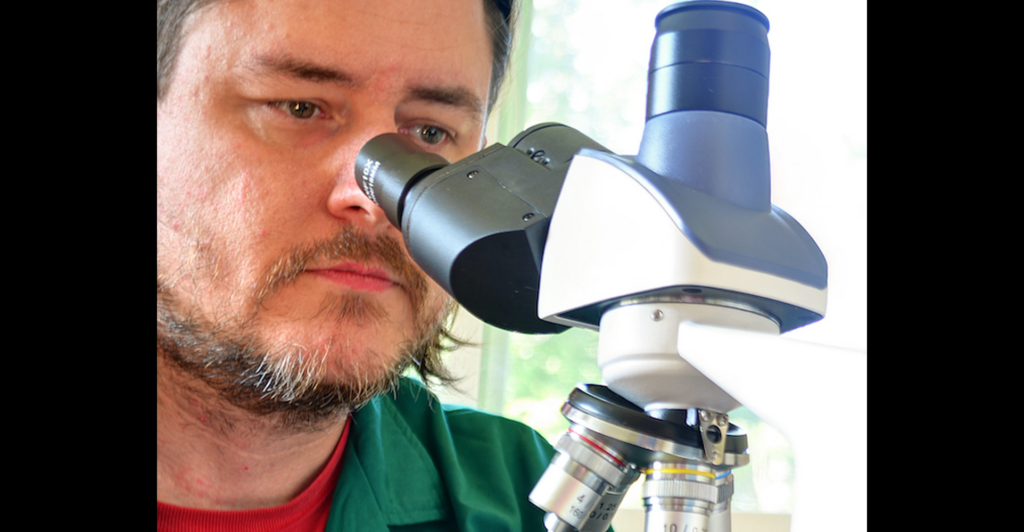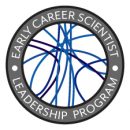In the Decoding Life series, we talk to geneticists with diverse career paths, tracing the many directions possible after research training. This series is brought to you by the GSA Early Career Scientist Career Development Subcommittee.
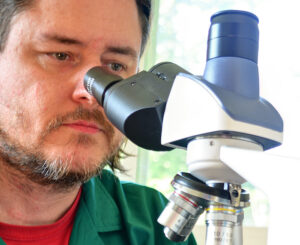
Stephen Klusza was inspired to become a scientist by his high school genetics teacher, whom he recalls was “ironically named Dr. Force.” In the middle of his graduate studies in biological sciences at Florida State University, he lost his ability to hear. Through determination, hard work, and supportive colleagues, Dr. Klusza continued his academic training and completed a postdoctoral appointment at the University of North Carolina. When he moved to Atlanta to serve as Adjunct Faculty at Atlanta Metropolitan State College, Dr. Klusza’s passion for helping students with diverse lived experiences grew even stronger. As an Assistant Professor of Biology at Clayton State University, Dr. Klusza continues to improve accessibility in his teaching and research for students with disabilities by combining his interests in expanding undergraduate research opportunities with universal design and open educational resources. He also leads the Diversity, Equity and Inclusion (DEI) Committee in the Genomics Education Partnership, aiming to provide bioinformatics research experiences to undergraduate students.
What inspired you to pursue a career in academia?
My inspiration goes back to my junior and senior years of high school. I was the salutatorian of my class and took almost every advanced placement class, of which biology was my favorite. I fell in love with genetics when I saw my teacher make the first Punnett square! I knew from that point on that I wanted to be a scientist. In the 1990s, being a scientist was more or less synonymous with academia. So, I wanted to be a geneticist and work at a university. Most people usually don’t get lucky in knowing what they want to do at such an early age, but my exposure to genetics in high school was pivotal in my career decision.
How was your graduate school experience as a PhD student with a disability?
My experience was overwhelmingly positive, as the department cared about its graduate students. I was diagnosed with profound hearing loss at the young age of 2. I still had some natural hearing and a hearing aid to supplement what I was missing, but it came to a point where I developed terrible tinnitus and lost the rest of my hearing during grad school, due to an undiagnosed birth defect in the inner ear. I had to go through a lot of medical appointments to figure out the cause. Through a specialist, I had the possibility of cochlear implantation to help restore hearing, which took about 2 years. The surgery was successful, and I actually heard more with the cochlear implant than I ever did with the hearing aid.
During this period, my mentor, Dr. Wu-Min Deng, and my lab colleagues were highly supportive. Dr. Deng kept me in his lab and let me spend all the time I needed to shuttle back and forth between doing experiments and seeing specialists. I was also doing teaching assistantships, which was very hard, but the students were understanding. I’d walk around with a dry erase board so that they could write their questions on it and I could answer them. It took me around 7 years to earn my PhD, but I was fortunate to receive support from grad school.
Did your experiences influence your career choices?
I don’t believe that my disability influenced my personal decision to go into genetics. Part of the reason why it was easier for me to navigate the academic job market was my disability required a minimum of accommodations to fit in. I never relied too much on accommodations in the workspace, particularly when I got my cochlear implants, so it influenced my experiences but not my chances.
When I was applying for jobs outside academia, there were times when I felt I was more than qualified for a position, but I didn’t get any response. In those situations, one can’t prove discrimination, but I had a gut feeling that they noticed my disability and threw my application out. I started thinking about which areas in science would be more welcoming to someone with a disability. I first worked as an Adjunct Faculty at Atlanta Metropolitan State College (AMC), where I really enjoyed teaching first-generation students. That changed my perspective on what I wanted to do in my life and started my current career trajectory.
I’ve learned a lot more about the inequalities in the system while going up the academic ladder. Even with my disability, I had the privilege of being a white male. This is not to say that my hard work was immaterial to my success, but I most likely had some privileges that are inherent in the present system.
How did you get to your position at Clayton State University?
While working at AMC, I was looking at other jobs to continue my advocacy and take on a more prominent role in teaching and research. At that time, CSU needed a temporary lecturer for biology for one year, and thankfully, they accepted me for the position. This position allowed me to spend a year at CSU. I had a lot of opportunities to meet with faculty of the biology department and other departments and our Dean. I was blown away by how inclusive and incredibly diverse CSU life is!
CSU has a much more visible presence for people with disabilities in jobs in administration, facilities, and management compared to other universities I have seen. It’s just a great place to be and to see how they guide students to better their lives. Luckily, there were Assistant Professor positions open. I applied for it and officially got the job in Fall 2020. As an Assistant Professor of Biology, I directly influence undergraduate students in research, and I love what I do!
How did you get involved with developing low-cost accessible educational resources?
College textbooks are expensive. For students who are unable to afford it, their ability to understand the material is reduced because they’re completely reliant on PowerPoint presentations. When I heard about “open educational resources,” such as writing a laboratory manual and books for free, I was amazed at how people spend a lot of time making no or low-cost resources that allow students to get involved in science. I’ve also seen labs devoted to creating low-cost lab equipment such as the Foldscope (Manu Prakash lab), which helps magnify images from a slide and costs only $10.
Not only are there financial issues, but there are barriers to accessibility in teaching. Some students may have a disability that requires video or audio material to be presented differently. Sometimes a syllabus or other documents are written in very small fonts and can prevent some students from reading it. So, I started getting into the “universal design” approach, combining it with open educational resources. I’m still learning, but I want to spend time helping students who want to do science but can’t afford it.
Can you provide examples on how to improve accessibility in teaching and research?
If I have a syllabus, I can change the font to “OpenDyslexic” – an open-source font that is friendly for students with dyslexia. I then try to talk to dyslexic students, asking if it helped. I make sure to use colorblind-friendly images. I have an audio version of the text or a text-to-speech applet for printed materials. In my presentations, I add text descriptions to images to help people with visual screen readers. I turn on subtitles in the presenter view of the new versions of Microsoft with the accessibility feature. I also try to teach slowly. If I don’t make it to the end of the PowerPoint, I record a video to finish the rest.
I try to understand the difficulties students have due to the inaccessibility of the physical spaces in our labs. I want to help make that accessible as I get funds. What if a student has cerebral palsy? I would make it my highest priority to secure Opentrons lab robotics to pipette for them. I try to be proactive in embedding accommodations. In my lab, I want everyone to feel comfortable, supported, and valued. They need to know that they belong to science and I’m here to advocate for them.
What suggestions do you have for scientific societies on building a diverse and inclusive work culture?
It’s not enough to have temporary measures in place to attract diversity. You’ve got to do the work to make the environment inclusive and supportive. We need to go deeper into the issues of why minorities or underrepresented groups face discrimination. This is continuing to be a problem and it’s disappointing. Things need to change. Let’s work together towards a solution and put our talk into action.
I want to pass on a message: if you ask people from underrepresented groups for DEI work and include their inputs, make sure you compensate them. Don’t expect them to do that for free. People that have undergone discrimination and faced barriers may have trauma from it. Being asked to do DEI work may re-traumatize them to the situation that they’ve lived in.
Do you have any advice for early career scientists with disabilities?
It’s an uphill battle. Your journey won’t be without pitfalls and obstacles. It’s hard to get through the feeling that you may be alone in your fight, but you are not alone. My most important piece of advice is to be a part of the community of disabled scientists on #DisabilityTwitter and other platforms. Other grad students and faculty with disabilities will support you and let you know which places are more likely to support a disability. Making connections will help you persevere.
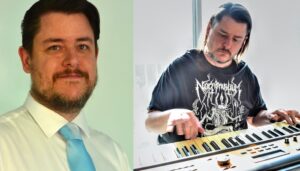
Stephen Klusza at the onset of the pandemic and after one year working from home.
About the author:
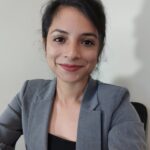
Oindrila De is a member of the Early Career Scientist Career Development Subcommittee and a PhD Candidate in the Department of Biology at Case Western Reserve University. She is passionate about making science inclusive and accessible to early career scientists with disabilities and leads the Accessibility and Disability Advocacy Group in the Early Career Leadership Program.

